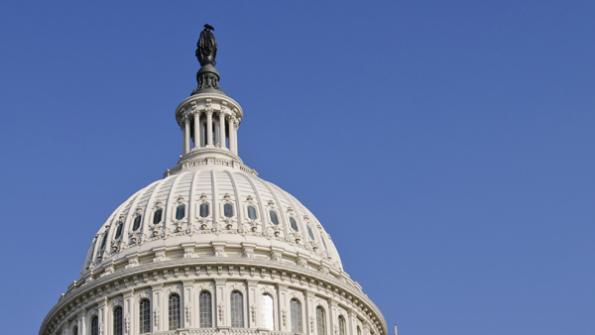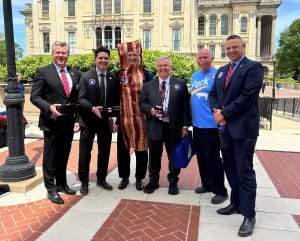Infrastructure package signed into law
Legislative Watch: Cattle bill to address cash market, transparency; COVID workplace requirement rule on hold.

The House of Representatives passed the $1.2 trillion Infrastructure Investment and Jobs Act, which includes $550 billion in new spending, with the remainder of the funding extending current programs. This will be the largest investment in infrastructure since the 1950s during the Eisenhower administration.
The infrastructure bill, which is one of President Biden's legislative priorities, is expected to be signed into law next week.
The bill passed after an agreement was reached among Democrats that the House of Representatives would vote on the Build Back Better bill before Nov. 15. Nineteen Republican members joined all but six Democrats in supporting the bill.
The administration estimates the legislation will support 700,000 jobs per year over the next 10 years.
The new funding includes $110 billion for roads and bridges, $65 billion to expand broadband access, $17 billion for ports and waterways, $66 billion for passenger and freight rail, $39 billion for public transit (buses, rail cars, stations and track, signals, and power systems), $25 billion for airports, $55 billion for water infrastructure (clean water and replacing lead pipes), and $73 billion for power and grid including grid reliability and resiliency. The legislation also includes $8 billion in funding to create the first federal network of charging stations for electric vehicles.
Included in the bill is funding for the locks and dams on the Upper Mississippi River, which has been a priority for agricultural and commodity organizations. This is vital to keep U.S. agricultural exports competitive in the international marketplace.
In addition, it includes greater flexibility under the current hours-of-service regulations by providing an additional 150 air-mile exemption for livestock haulers on the destination of hauls.
A number of agricultural organizations released statements praising the passage of the bill, including the Agricultural Retailers Association, American Farm Bureau Federation, American Soybean Association, Farm Credit Council, National Association of State Departments of Agriculture, National Association of Wheat Growers, National Cattlemen's Beef Association, National Corn Growers Association, and National Farmers Union.
Cattle bill to address cash market and transparency
The Cattle Price Discovery and Transparency Act is designed to improve the cattle market by improving price discovery and transparency. The bill would require packers to participate in the cash market on a plant-by-plant basis within each major cattle region.
Senators Chuck Grassley, R-Iowa, Deb Fischer, R-Neb., Jon Tester, D-Mont., and Ron Wyden, D-Ore., plan to introduce the bill in the near future.
“This bill takes several steps to improve cattle price transparency and will improve market conditions for independent producers across the country,” Senator Grassley said.
Fischer commented, "Robust price discovery ensures that all members of the beef supply chain — cow-calf producers, feeders, packers and consumers — can be successful. Our compromise proposal takes regional differences into account and ensures fairness for every segment of the supply chain."
Tester noted that Increasing spot transactions will give producers more control and better information selling livestock, “which is critical to helping them meet their bottom line.”
In a press release, the senators said the legislation would:
Establish regional mandatory minimum thresholds of negotiated cash and negotiated grid trades based on each region’s 18-month average trade to enable price discovery in cattle marketing regions. In order to establish regionally sufficient levels of negotiated cash and negotiated grid trade, the secretary of agriculture in consultation with the chief economist, would seek public comment on those levels, set the minimums, and then implement them. No regional minimum level can be more than three times that of the lowest regional minimum, and no regional minimum can be lower than the 18-month average trade at the time the bill is enacted.
Require the U.S. Department of Agriculture (USDA) to create and maintain a publicly available library of marketing contracts between packers and producers in a manner that ensures confidentiality.
Prohibit the USDA from using confidentiality as a justification for not reporting and make clear that USDA must report all Livestock Mandatory Reporting (LMR) information. They also must do so in a manner that ensures confidentiality.
Require more timely reporting of cattle carcass weights as well as requiring a packer to report the number of cattle scheduled to be delivered for slaughter each day for the next 14 days.
The bill has been endorsed by the American Farm Bureau, National Farmers Union and U.S. Cattlemen's Association.
However, the North American Meat Institute (NAMI) said the bill ignores economic fundamentals.
"If this bill becomes law, there will be cattle producers who want alternative marketing arrangements, but will instead be forced to sell on the cash market, and the industry will turn back time to the days of commodity cattle,” said NAMI President and CEO Julie Anna Potts.
COVID workplace requirement rule on hold
The Fifth U.S. Circuit Court of Appeals, based in New Orleans, temporarily blocked the Biden administration's recently announced rule that requires companies with 100 or more employees to ensure the employees are vaccinated or tested weekly for COVID-19. The Court said the rule raises "grave statutory and constitutional issues."
Sources: P. Scott Shearer, who are solely responsible for the information provided, and wholly own the information. Informa Business Media and all its subsidiaries are not responsible for any of the content contained in this information asset.
About the Author(s)
You May Also Like


